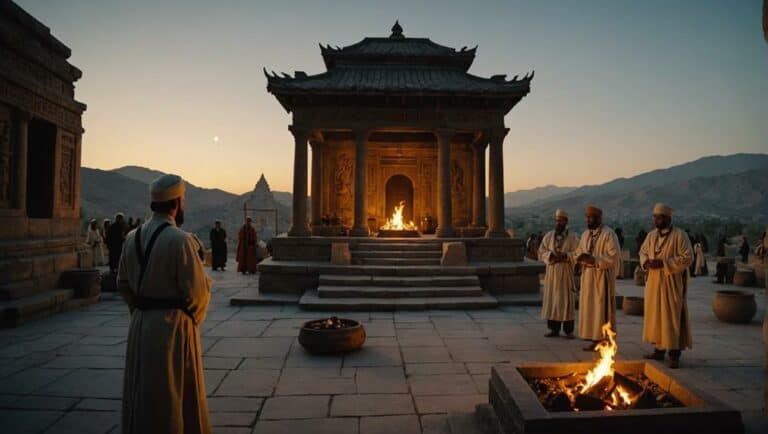Discover the ancient roots of Zoroastrianism, a pioneering monotheistic faith from Persia founded by the prophet Zoroaster that reveres Ahura Mazda and fire as symbols of purity.
Unveil how its profound moral dualism and ethical teachings have significantly influenced the Abrahamic religions and continue to shape spiritual thought.
Origins and Founding
The origins of Zoroastrianism, deeply rooted in ancient Persia, remain enigmatic with its teachings believed to have been divinely revealed to the prophet Zoroaster. Early Zoroastrianism emerged in a region where various indigenous religions practiced polytheism and ritualistic traditions. Despite this, Zoroastrianism stands out as one of the oldest major world religions, predating its own founder.
Zoroaster, regarded as a prophet rather than a divine figure, introduced a radical shift in spiritual thought by advocating for monotheism. He proclaimed the existence of a singular, supreme God named Ahura Mazda, who embodies all that's good and righteous. This belief starkly contrasted with the polytheistic practices of surrounding cultures and laid the groundwork for a unique religious identity centered around ethical living and moral choices.
In its foundational principles, early Zoroastrianism emphasized the duality of good and evil, urging followers to actively choose righteousness over deceit. This monotheistic and ethical framework underpins the religion's long-standing heritage.
As you explore the complex history of Zoroastrianism, you'll appreciate its profound influence on spiritual and philosophical thought through the ages.
Followers and Holy Texts
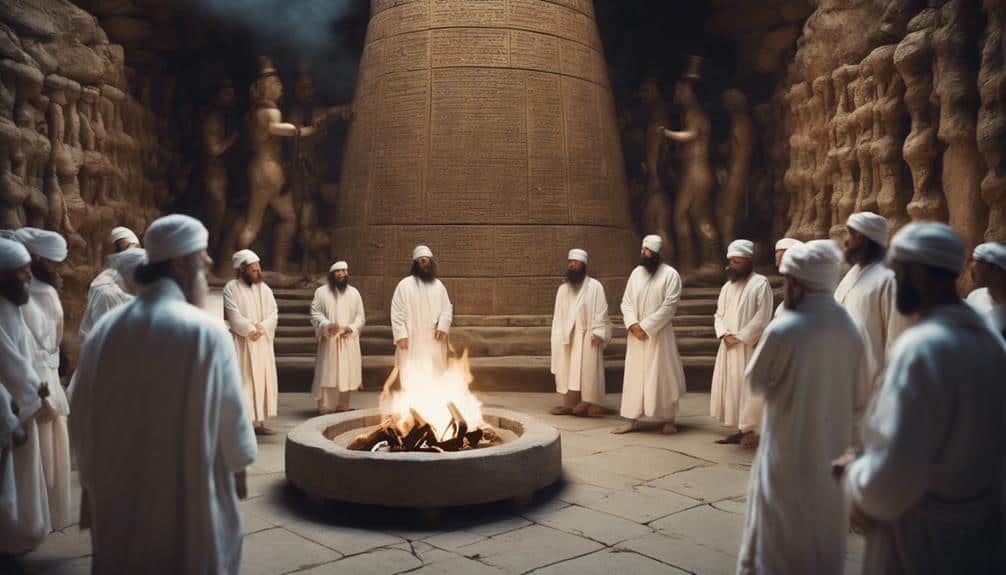
In Zoroastrianism, followers known as Parsis diligently study the Avesta, the sacred text that underpins their doctrinal beliefs and ethical practices. The Avesta isn't just a religious text; it's the cornerstone of Zoroastrian law and language, shaping every aspect of a Parsi's spiritual journey.
Much like the Torah in Judaism and the Bible in Christianity, the Avesta provides a thorough framework for understanding divine commandments and moral principles.
As a Parsi, you're encouraged to immerse yourself in the Avesta to grasp its intricate teachings and apply them to daily life. This sacred text encompasses hymns, prayers, and ritual directives, offering guidance on how to live a life aligned with Zoroastrian values.
Its influence parallels the way the Torah and the Bible inform the ethical and spiritual lives of Jews and Christians, respectively.
The Avesta's role is pivotal in shaping the rituals and moral compass of Zoroastrianism. By studying it, you're not just following a tradition but engaging in a profound practice that connects you to ancient wisdom. This deep engagement reflects a commitment to uphold and propagate the faith's enduring principles.
Divine Concepts
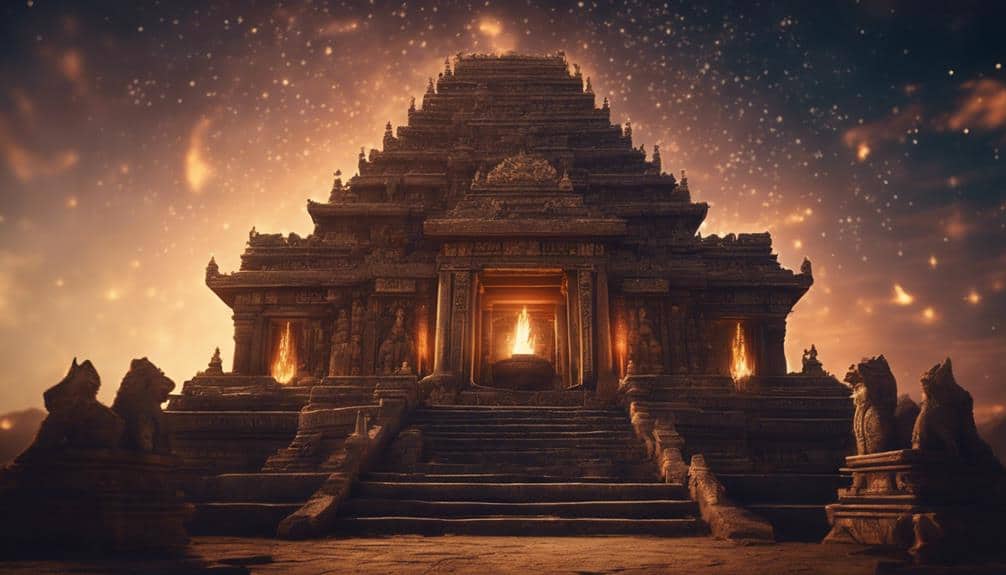
As you explore the divine concepts in Zoroastrianism, you'll notice the significant evolution from polytheism to monotheism, centering on the worship of Ahura Mazda.
This shift underscores a profound theological development, positioning Ahura Mazda as the embodiment of wisdom, truth, and cosmic order.
Analyzing the importance of this deity reveals how Zoroastrianism's ethical dualism requires adherents to commit to good thoughts, words, and deeds.
Evolution to Monotheism
Zoroastrianism's shift from polytheism to monotheism signified a profound reorientation toward the exclusive veneration of Ahura Mazda, underscoring his supreme authority and inherent goodness. This monotheistic alteration holds immense historical significance as it marked a decisive shift in the religious landscape of ancient Persia. The shift towards oneness not only streamlined the theological framework but also emphasized the singular divine authority, purity, and goodness of Ahura Mazda.
The theological implications of this evolution were far-reaching. By focusing on Ahura Mazda's supremacy, Zoroastrianism delineated a clear dichotomy between good and evil, light and darkness, which provided a moral compass for its adherents. This religious evolution towards monotheism left an indelible mark on subsequent religious traditions, influencing the development of later Abrahamic faiths such as Judaism, Christianity, and Islam.
Contrasting with the earlier polytheistic practices, where multiple deities were worshipped for various aspects of life, this monotheistic focus brought a unified, moralistic vision to the Zoroastrian faithful. It underscored the idea that a single divine entity, Ahura Mazda, encapsulated all that was holy and righteous, thereby simplifying and elevating the spiritual discourse of the time.
Ahura Mazda's Significance
Ahura Mazda stands as the central figure in Zoroastrianism, embodying the ultimate principles of wisdom, truth, and goodness. As the supreme deity, Ahura Mazda is revered as the divine creator of the universe, orchestrating the cosmic order and opposing the forces of darkness and chaos. In Zoroastrian belief, Ahura Mazda's essence is interwoven with all that's positive, just, and righteous, providing a foundation for moral guidance.
You'll find that Ahura Mazda's significance extends beyond mere creation; this supreme deity actively maintains the balance of the world. The association with the Amesha Spentas, divine beings representing various aspects of creation and morality, further exemplifies Ahura Mazda's inclusive role. These divine entities, such as Spenta Mainyu (Good Spirit) and Asha Vahishta (Best Truth), serve as extensions of Ahura Mazda's attributes, guiding followers in their pursuit of righteousness.
Worship of Ahura Mazda isn't confined to abstract reverence; it involves tangible acts of devotion, including prayers and rituals that honor these divine qualities. By adhering to Ahura Mazda's principles, Zoroastrians aim to contribute to the triumph of order and justice in the world, embodying the moral guidance their supreme deity provides.
Prophets and Leaders
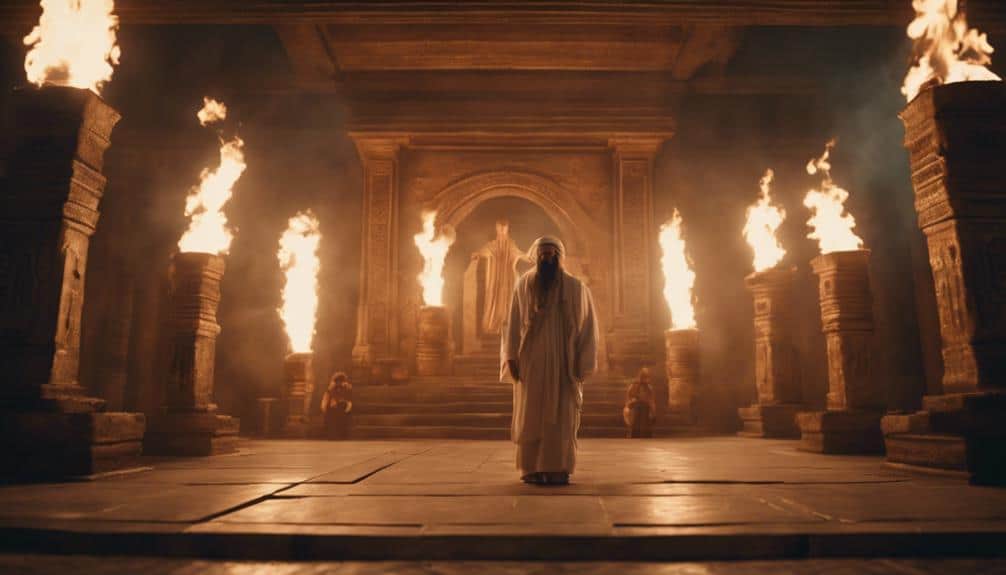
As you explore the pivotal roles of prophets and leaders in Zoroastrianism, you'll find that the Magi aren't merely priests but spiritual guides wielding significant influence.
They often engage in profound practices, including the use of natural psychedelics like the Helma plant, to enhance their spiritual insights.
Prophets like Zoroaster have been instrumental in steering followers toward monotheism, while the Magi interpret and uphold the religion's core teachings.
Role of Magi
How do the Magi shape the spiritual and ethical framework of Zoroastrianism through their roles as prophets and leaders?
The Magi, as priests vested with spiritual authority, are central to guiding Zoroastrian adherents towards the monotheistic worship of Ahura Mazda. Their role transcends traditional priesthood, combining ritualistic duties with profound spiritual guidance. The Magi often engage in mystical experiences, some of which involve natural psychedelics like the juice of the Helma plant, to deepen their connection with the divine and interpret spiritual visions. These practices reinforce their authority and enable them to impart wisdom that aligns with the teachings of Zoroaster.
As prophets, the Magi uphold and propagate Zoroastrian doctrines, countering polytheistic beliefs and ensuring the continuity of monotheistic worship. Their leadership is pivotal in maintaining ethical norms within the community, offering moral guidance that's rooted in ancient scriptures. By embodying the principles of Zoroastrianism, they inspire followers to live virtuous lives, fostering a collective adherence to the faith's core values.
The Magi's influence is instrumental in shaping both the spiritual and ethical dimensions of Zoroastrianism, ensuring its resilience and relevance through the ages.
Zaara Through Stre
Building upon the foundational role of the Magi, Zaara Through Stre emerges as a pivotal prophet who steadfastly guided Zoroastrians towards the monotheistic worship of Ahura Mazda, firmly rejecting polytheistic traditions. This evolution marked a significant monotheistic shift, directing followers to embrace the worship of a singular divine entity. Zaara Through Stre's spiritual teachings and divine guidance became instrumental in shaping the ethical framework of Zoroastrianism.
His emphasis on ethical principles and moral values highlighted the importance of living a righteous and virtuous life. Zaara Through Stre's prophetic influence extended beyond mere religious rituals, embedding profound moral values into the daily lives of his followers. Through his teachings, Zoroastrians were encouraged to practice good thoughts, good words, and good deeds, reinforcing a community centered on ethical behavior.
Zaara Through Stre's contributions weren't limited to spiritual guidance; he actively shaped the religious and cultural practices of Zoroastrianism. By focusing on the worship of Ahura Mazda, he helped establish a coherent and unified belief system. His role in this monotheistic transformation underscored the transformative power of prophetic leadership, making Zaara Through Stre an enduring figure in Zoroastrian history.
Religious Practices
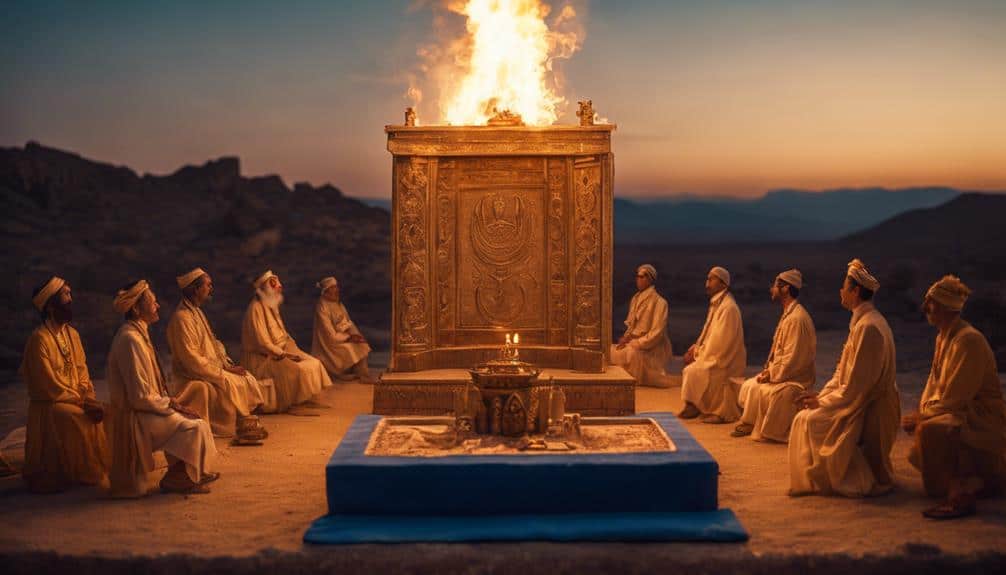
Delving into the religious practices of Zoroastrianism reveals a profound emphasis on rituals centered around fire worship, symbolizing the divine essence of Ahura Mazda. As a Zoroastrian, you're likely familiar with the central role that fire temples play in your faith.
Fire, representing God's warmth and purity, is meticulously tended to, reflecting the importance of both physical and spiritual cleanliness. Purity rituals are integral, underscoring the necessity of maintaining a life free from physical and moral contamination.
Ceremonial prayers are another cornerstone of Zoroastrian worship. These prayers, often recited in the ancient Avestan language, are acts of divine veneration directed towards Ahura Mazda. They serve to reinforce the ethical triad of good thoughts, words, and deeds, which is central to the Zoroastrian ethical framework.
Additionally, pilgrimages to sacred sites and temples are common among followers. These journeys foster a deep spiritual connection and seek divine blessings. Visiting places like the Atash Behram, the highest grade of fire temple, allows you to experience a profound sense of community and spirituality.
Understanding these practices provides valuable insight into how Zoroastrians live their faith with devotion and integrity, reflecting their commitment to a life of purity and righteousness.
Influence on Abrahamic Religions
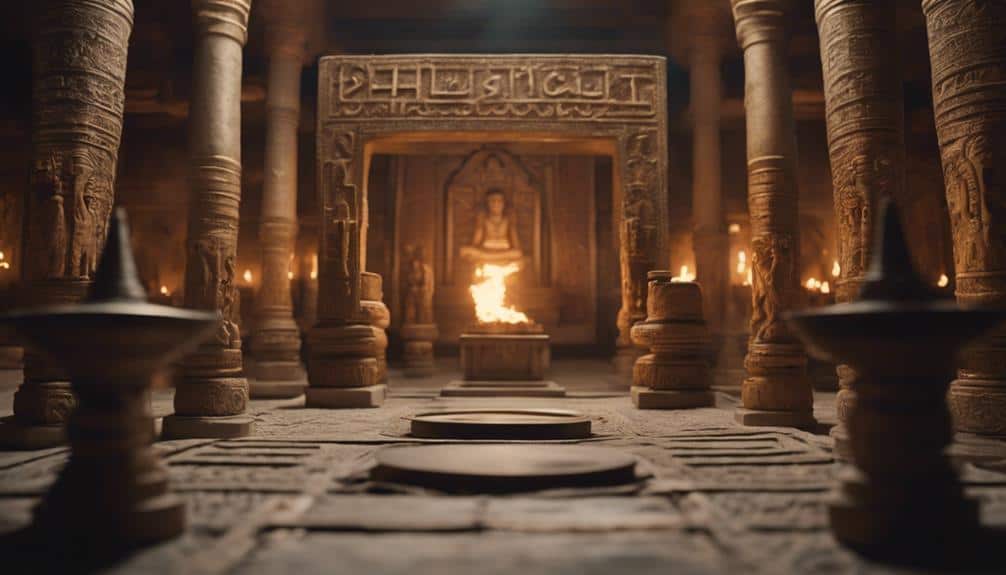
Zoroastrianism's theological concepts have profoundly shaped the development of Abrahamic religions, particularly in their understanding of divine guidance, moral dichotomy, and monotheism. You're likely to find striking similarities in beliefs when comparing Zoroastrianism with Judaism, Christianity, and Islam. These shared theological concepts underscore the historical connections between these faiths.
- Divine Guidance and Prophets: Zoroastrianism places significant emphasis on prophets and divine revelation, a concept mirrored in the Abrahamic traditions. Zoroaster's role as a prophet who conveys divine wisdom is akin to figures like Moses, Jesus, and Muhammad.
- Moral Dichotomy: The Zoroastrian dualistic worldview, which presents a clear battle between good and evil forces, resonates in the moral struggles central to Abrahamic religions. This dualism informs the ethical frameworks of these faiths.
- Monotheism Evolution: Zoroastrianism's shift from polytheism to monotheism parallels the development of monotheistic beliefs in Abrahamic religions. Ahura Mazda's singular divinity foreshadows the monotheistic God of Judaism, Christianity, and Islam.
- The Problem of Evil: Zoroastrianism's unique approach to the problem of evil—acknowledging both good and evil within the divine domain—finds echoes in later theological discussions within Abrahamic traditions.
Afterlife and Ethics
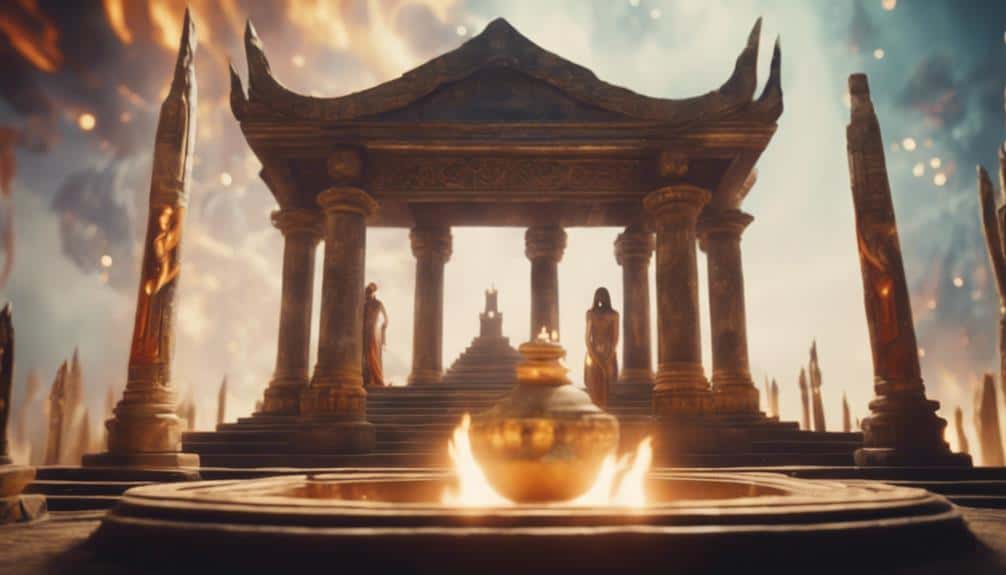
In Zoroastrianism, the afterlife journey hinges on the individual's ethical conduct, underscoring the religion's emphasis on personal responsibility and moral rectitude. Central to this belief is the Chinvat Bridge, which every soul must cross after death. Your moral conduct during your earthly life directly influences this passage. If you've lived righteously, the bridge widens, ensuring safe passage to paradise. Conversely, a life marked by deceit and malevolence narrows the bridge, leading to a perilous journey that ends in hell.
Zoroastrian ethics revolve around three core principles: righteousness, truthfulness, and good deeds. These principles serve as the yardstick by which your actions are measured during divine judgment. The soul's journey is a reflection of how well you adhered to these ethical mandates.
This final judgment isn't merely a celestial audit but a profound reflection of the Zoroastrian belief in the inherent responsibility of the individual.
Worship and Symbolism
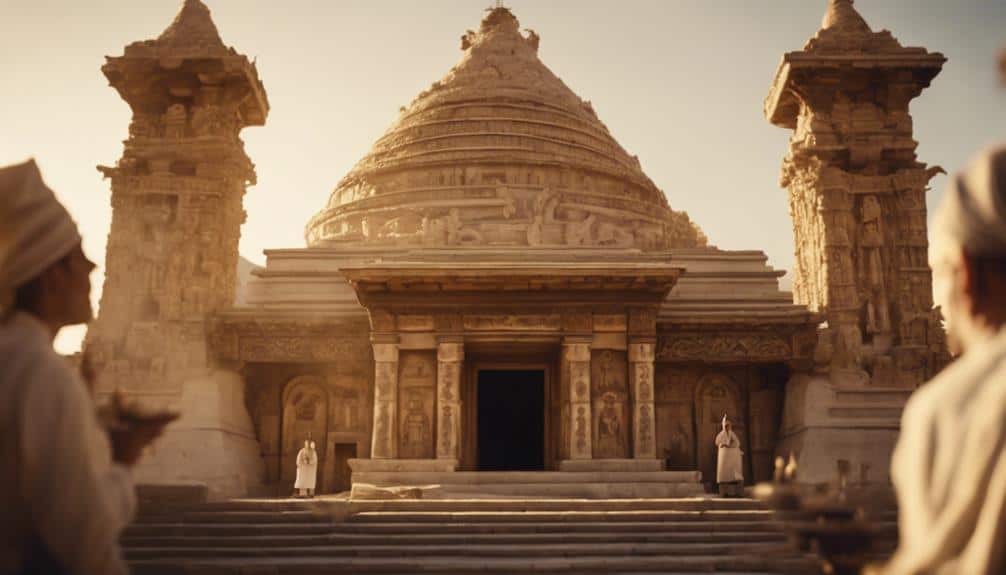
As the ethical framework of Zoroastrianism shapes the soul's journey after death, its worship practices and rich symbolism further illuminate the path of righteousness and moral integrity. Central to Zoroastrian worship is fire symbolism, which represents God's warmth and purity. Fire isn't worshipped itself but serves as a physical manifestation of divine presence, guiding adherents towards ethical behavior.
One prominent symbol in Zoroastrianism is the Faravahar, depicting a winged figure that encapsulates the eternal soul and the spectrum of human choices. The Faravahar serves as a reminder of the individual's responsibility to act righteously and make moral decisions.
The worship practices and symbols of Zoroastrianism are deeply interwoven with its ethical teachings, emphasizing the triple principle of good thoughts, good words, and good deeds. Adherents believe that these principles are essential in determining one's destiny and aligning with divine will.
To further understand Zoroastrian worship and symbolism, consider the following key elements:
- Fire Temples: Centers for communal worship where sacred fires burn perpetually.
- Faravahar Symbol: Represents the soul's journey and moral choices.
- Ritual Purity: Emphasizes spiritual and physical cleanliness.
- Ethical Living: Focus on actions that promote good thoughts, words, and deeds.


